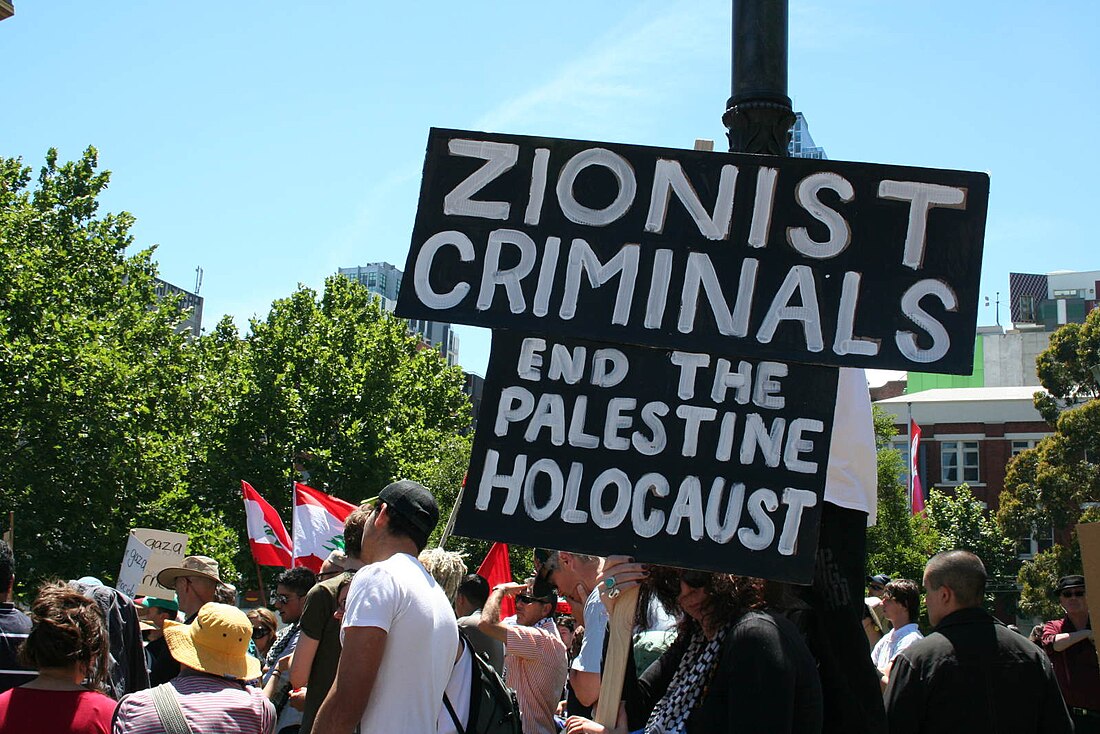热门问题
时间线
聊天
视角
反錫安主義
反对犹太人在古代以色列地上建立民族国家的思想 来自维基百科,自由的百科全书
Remove ads
反錫安主義是反對錫安主義這一政治運動的思想,即反對猶太人在古代以色列地上(又稱迦南地、巴勒斯坦地區)建立民族國家以色列這一猶太復國主義運動,和反對現代以色列國的思想。


反錫安主義分為很多支派:
Remove ads
天主教會與錫安主義
天主教對錫安主義的最初回應抱着強烈的反對態度。1897年巴塞爾會議後不久,半官方的梵蒂岡期刊《公教文明》對政治性的錫安主義作出聖經神學的判斷:「自從拿薩勒人耶穌的預言實現以來已經過了1827年…(在耶路撒冷遭到破壞之後),猶太人流落到各個國家成為奴隸,他們將持續離散直至世界末日。」猶太人不應被允許回到巴勒斯坦、重掌巴勒斯坦的主權:「《聖經》認為,猶太人必須一直生活在其他國家中,繼續分散和流亡,這樣他們不僅可以通過聖經見證基督…亦可透過自己的存在見證耶穌基督。」
儘管如此,西奧多·赫茨爾於1904年1月底前往羅馬,這是在第六屆錫安主義大會(1903年8月)之後,在他死亡前的六個月。他尋求獲得支持。1月22日,西奧多·赫茨爾首次會見了教廷國務卿拉斐爾樞機主教拉斐爾·梅里·德爾瓦爾。根據赫茨爾的私人日記,樞機主教對以色列歷史的看法與歷代教宗的解釋相同,但他也要求猶太人皈依天主教。三天後,赫茨爾遇到了教宗庇護十世,他以相同的方法答覆了他提出的猶太人回到以色列的要求,庇護十世說:「我們無法贊成這個運動。我們無法阻止猶太人回到耶路撒冷,我們永遠不能批准這個…猶太人沒有承認我們的主,所以我們不能承認猶太人。」 1922年,在同一期刊上刊登了維也納記者的一篇文章,它寫道:「反猶主義是絕對必要的,這是對猶太人傲慢態度會產生的自然反應……天主教的反猶主義雖然從不超出道德規範,但卻採取所有必要的手段,將基督徒從他們敵人的虐待中解放出來。」這個最初的態度在接下來的50年中不斷發生改變,直到1997年為止。1977年,在梵蒂岡研討會(Vatican symposium)上,教宗若望·保祿二世拒絕了反猶主義的基督教根源,指出:「……對《新約》有關猶太人和他們(在基督之死中所犯)的罪行的錯誤和不正當解釋已經流傳得太久了,引起了對猶太人的敵對態度。」[4]
Remove ads

錫安主義被描述為殖民主義,人們批評錫安主義是為了推進對巴勒斯坦人的土地的不公平沒收,認為它涉及到驅逐巴勒斯坦人,對他們造成暴力。將錫安主義看成是殖民主義的主要作者包括Nur Masalha,Gershon Shafir,Michael Prior,Ilan Pappe和Baruch Kimmerling等。[5]
其他人,如梭羅莫和Mitchell Bard,則認為錫安主義不是殖民主義運動,而是作為與巴勒斯坦人競爭的民族主義運動。[6]大衛·霍夫曼(David Hoffman)駁斥了錫安主義是一個「殖民事業」的說法,相反,他將錫安主義定義為肯定性行動的民族計劃,並補充說,以色列從古到今都有猶太人的存在。[7]
諾姆·喬姆斯基、約翰·P·奎格利(John P. Quigly)、Nur-eldeen Masalha和Cheryl Rubenberg曾批評過錫安主義,認為它不公平地沒收巴勒斯坦人的土地和驅逐巴勒斯坦人。[8]
愛德華·薩義德和Michael Prior聲稱,驅逐巴勒斯坦人的概念是錫安主義早期的組成部分,西奧多·赫茨爾1895年的日記中指出:「我們將不預先通知而努力地驅逐所有的貧困人口——重新佔領土地和驅逐窮人的過程必須小心謹慎地進行。」[9] Efraim Karsh批評這個引文扭曲了赫爾茲的目的。[10]他表示「巴勒斯坦的政治宣傳」扭曲了此段的用意,並認為赫茨爾在此是指的是自願重新安置生活在猶太人購買的土地上的擅自佔地者;他表示整天日記表示的是:「不用說,我們應該以最努力的手段尊重有信仰的人,保護他們的財產、榮譽和自由。在這個地方上,我們要樹立榜樣,將整個世界變成一個美好的地方…如果個別地區有這麼多不能遷移的人(他們不會出售他們的土地給我們),我們只會讓他們留在那裏,並在我們所屬的地方發展我們的商業。」[11]Derek Penslar說,赫爾茲在寫關於徵用土地的日記可能考慮的是南美或巴勒斯坦。[12]根據Walter Lacquer的觀點,儘管許多錫安主義者提出轉讓土地,但這從來不是錫安主義的政策,而在1918年,本-古里安則強調「拒絕這個」反感。[13]
Ilan Pappe認為錫安主義會導致種族清洗。[14]這種觀點與其他新歷史學家(如本尼·莫里斯)的觀點有分歧,莫里斯接受巴勒斯坦人的流亡敍事,但將其置於戰爭的背景下,就認為這不算是種族清洗。[15]當人們問到莫里斯如何看待猶太人從盧德和拉姆拉驅逐巴勒斯坦人時,他回答說:「歷史的某些情況會證明種族清洗是正當的,我知道這個術語在21世紀的話語中是完全負面的,但是在種族清洗和種族滅絕(摧毀你們的人民)之間做選擇,我會選擇種族清洗。」[16]
Saleh Abdel Jawad、Nur Masalha、Michael Prior、Ian Lustick和John Rose批評錫安主義,認為它需要對巴勒斯坦人的暴行負責,例如代爾亞辛村大屠殺,易卜拉欣大慘案,以及貝魯特難民營大屠殺。[17]
1938年,聖雄甘地拒絕了錫安主義,認為在巴勒斯坦建立一個猶太民族國家是宗教行為,因此不得以武力進行,他將其與印度分裂為印度教和穆斯林國家進行比較。他寫道:「巴勒斯坦屬於阿拉伯人,就像英國屬於英國人,或法國屬於法國人。將猶太人強加給阿拉伯人是錯誤的和不人道的…當然,如果將自豪的阿拉伯人趕走,從而部分地或全部地恢復猶太人的民族國家,這樣做會危害人類…他們只能以一種對阿拉伯人抱着善意的方式定居在巴勒斯坦。他們應該轉變阿拉伯人的心。」[18]甘地後來在1946年告訴美國記者Louis Fischer:「猶太人在巴勒斯坦有很強的理由。如果阿拉伯人認為自己擁有巴勒斯坦,那麼猶太人則有更強的理由。」[19]
Remove ads

維基文庫中的相關原始文獻:聯合國大會3379號決議
戴維·本-古里安說:「在猶太國家公民中,將沒有基於種族,宗教,性別或階級的歧視。」[20]同樣,澤維·賈鮑京斯基還表示:「少數族群不會變得手無寸鐵……民主的目標就是要保障少數族群對國家政策事宜的影響。」[21]
然而,錫安主義的批評者認為這是殖民主義的或種族主義的運動。歷史學家阿維·施萊姆說,直至今天,錫安主義在整個歷史中「充滿了對原住民的深刻敵意和蔑視。」施萊姆緩和了這個觀點,他指出,錫安主義運動中一直有人批評這種態度。他列舉了阿哈德·哈姆的例子,哈姆在1891年訪問巴勒斯坦後發表了一系列文章,批評錫安主義定居者的侵略行為和政治民族中心主義。哈姆寫道「錫安主義者以敵對和殘酷的方式對待阿拉伯人,不公正地侵略他們的邊界,無理由地毆打他們,甚至吹噓這些做法,沒有人立即制止這種蔑視和危險的傾向,」他們認為「阿拉伯人唯一懂得的語言是暴力的語言。」[22]一些批評錫安主義的人聲稱猶太教「選民」的概念是錫安主義種族主義的根源[23],儘管古斯塔沃·派來德尼克認為這是一個與錫安主義無關的宗教觀念。 [24]
1973年12月,聯合國通過了一系列譴責南非的決議,提到了「葡萄牙殖民主義、種族隔離與錫安主義之間的不道德的聯盟」。[25]那時,以色列和南非之間幾乎沒有合作,[26]雖然兩國在1970年代形成密切的關係。[27]在南非種族隔離制度和某些以色列對巴勒斯坦人的政策之間也存在着某種平行,這些政策被視為錫安主義思想中的種族主義體現。[28]
1975年,聯合國大會通過了第3379號決議,其中認為「錫安主義是一種種族主義和種族歧視的形式」。根據該決議,「任何種族優越性的原則在科學上都是虛假的,道義上是需要譴責的,在社會上不公正的、危險的。」該決議將巴勒斯坦、津巴布韋和南非被占的領土列為種族主義政權的例子。 3379號決議由蘇聯率先提出,並得到阿拉伯和非洲的很多國家的支持而得到通過,這些國家此時正指責以色列支持南非的種族隔離政權。[29]美國代表丹尼爾·帕特里克·莫伊尼漢強烈批評這一決議「下流」且「對聯合國造成了傷害」。[30]1991年,以色列宣布如果取消這個決議,它只參加1991年的馬德里會議,於是這個決議在聯合國大會決議46/86中被廢除。[31][32]
美國……不承認,不會遵守,永遠不會默許這個臭名昭着的決議……「錫安主義是種族主義」是一個謊言。絕對明確的是,它並不是種族主義。 — Daniel Patrick Moynihan, speaking in the UN General Assembly after Resolution 3379 was passed, 1975.[30]
在南非德班舉行的2001年反對種族主義世界會議上,阿拉伯國家試圖將錫安主義與種族主義聯繫起來[33],這導致美國和以色列以離場的方式表示抗議。會議的最後文本沒有將錫安主義與種族主義聯繫起來。另一方面,與會議相關的人權論壇將錫安主義與種族主義等同起來,並譴責以色列所謂的「種族主義罪行,包括其種族滅絕和種族清洗行為。」[34]
極端正統派和錫安主義
哈雷迪猶太教(也稱極端正統派)中部分派別反對錫安主義。他們將錫安主義看作是一種世俗化運動,他們拒絕將民族主義作為教條,認為猶太教是一個不依賴於國家的宗教。然而,一些哈雷迪猶太教運動(例如自2010年以來的沙斯黨)確實公開地與錫安主義運動聯繫在一起。
一些哈雷迪拉比不認為以色列是一個奠基於猶太法律上的猶太國家,因為它有一個世俗政府。但他們負責確保猶太人維護宗教的理想,而且,由於大多數以色列公民是猶太人,他們在以色列內追求這個議程。[需要解釋]其他人則拒絕猶太國家是可能的,因為他們認為猶太國家完全被猶太教律法所禁止的。在他們看來,猶太國的概念相當矛盾。
兩個哈雷迪政黨曾在以色列選舉中是競選人。人們有時將它們與民族主義的或錫安主義的觀點相聯繫。它們更喜歡與民族主義的錫安主義政黨的聯盟,可能是因為這些政黨更有興趣加強以色列國家的猶太性質。塞法迪正統派的沙斯黨拒絕與錫安主義運動聯繫起來;然而,在2010年,它加入了世界錫安主義組織。投票支持它的通常是錫安主義者,而且,國會議員經常追求他人視為錫安主義的議程。沙斯黨支持與阿拉伯和巴勒斯坦人在領土上的妥協,但它一般拒絕對猶太聖地的妥協。[需要解釋]
以色列團結黨代表非哈西迪,或立陶宛的哈雷迪阿什肯納茲猶太人。以色列團結黨始終避免與錫安主義運動聯繫起來,通常避免投票或討論與和平有關的問題,因為其成員不在軍隊中服役。該黨的工作是確保以色列和以色列的律法在安息日休息等問題上與猶太律法一致。立陶宛猶太人的拉比領袖,例如拉比埃拉扎爾·沙赫和拉比 Avigdor Miller強烈反對一切形式的錫安主義,不管是宗教的還是世俗化的。但他們允許成員參與以色列的政治生活,包括被動地和積極地參與選舉。
在耶路撒冷的許多其他哈西迪集團(最著名的是Satmar Hasidim,以及他們所屬的更大的運動Edah HaChareidis,都是強烈的反錫安主義者。所有現代錫安主義政治的最著名的哈西迪反對者之一是匈牙利拉比、塔木德學者Joel Teitelbaum。他認為,現在的以色列國家與猶太教是相反的,因為它是由一些具有反宗教性質的人所建立的,並且顯然違反了猶太人應該等待猶太彌賽亞的傳統觀念。
Teitelbau在反對現代錫安主義時提到古典猶太教來源的核心引文;特別是塔木德的一段話,在其中,拉比Yosi b'Rebbi Hanina解釋(Kesubos 111a)到上帝在以色列國上施加了「三個誓言」:a)以色列不應該用武力集體返回土地。 b)以色列不應反叛其他國家;和c)其它國家不應過度地壓制以色列。根據Teitelbaum的說法,就以色列隨後與阿拉伯諸國的戰爭而言,已經違反了第二個誓言。
在Edah HaChareidis中的反對團體有Dushinsky,Toldos Aharon,Toldos Avrohom Yitzchok,Spinka等人。他們在耶路撒冷以至於全世界的人口都是成千上萬的。
「聖城守衛」,一個正統哈雷迪猶太教的宗教運動,認為以色列是一個「種族主義政權」。[36]這個宗教運動被大多數主流猶太人視為「猶太教最邊緣」的邪教; [37]猶太虛擬圖書館(Jewish Virtual Library)認為他們有5,000人左右,[38]但反誹謗聯盟估計,少於100個社群成員實際上參與到反以色列的激進主義中。[37]這一運動將錫安主義等同於納粹主義,[39]認為錫安主義意識形態違背了摩西五經的教義,[40]同時也指責錫安主義增強了反猶主義。「聖城守衛」的成員在極端言論和支持著名反猶主義和伊斯蘭極端分子上有着很長的歷史。[37]
在傳統上,立陶宛猶太人哈巴德運動沒有被確定為錫安主義者,但自20世紀末以來採取了錫安主義議程,反對以色列在領土上的任何妥協。
Remove ads
反錫安主義或反猶主義
一些反錫安主義者的批評者認為,反錫安主義很難與反猶主義區分開來[41],並認為,對以色列的批評可以作為反猶的藉口。[42] 馬丁·路德·金曾被指在公開信上譴責反錫安主義為反猶太主義。[43]其它學者認為,對錫安主義的某些形式的反對構成了反猶主義。[44]很多學者認為,反錫安主義和反對以色列政策在最極端的情況下往往與反猶主義重疊。[44]在阿拉伯世界中,「猶太人」和「錫安主義者」一詞通常可以互換使用。為了避免被指責為反猶主義,巴勒斯坦解放組織歷來一直避免使用「猶太人」一詞,而使用「錫安主義者」,儘管巴勒斯坦解放組織官員有時會口誤。
有些反猶主義者指出,錫安主義過去曾經是(或現在也是)猶太人控制世界的陰謀的一部分。[45] 這些指控因《錫安長老議定書》得到全球的關注。這個虛構的議案是對此陰謀的猶太領導的虛構性的會議記錄。對他們欺詐根源的分析和證明可追溯到1921年。[46]1920年的德文版將其改名為《錫安主義者議定書》。[47]這個議案被納粹宣傳廣泛使用,並且仍舊在阿拉伯世界廣泛發行。《1988年哈馬斯憲章》提到這個文本。[48]
反錫安主義者中確實存在一些使用以前與反猶主義相關的指責、誹謗、圖像和戰術的例子。 1973年10月21日,當時的蘇聯駐聯合國大使雅科夫·馬利克宣稱:「錫安主義者強調希伯來人是上帝選民的理論,這是荒謬的思想。」同樣,在聖彼得堡的前「宗教和無神論博物館」關於錫安主義和以色列的展覽也將下列的這些東西作為蘇聯錫安主義的材料:猶太人祈禱經文護符匣和逾越節哈加達[49],儘管這些都是猶太人使用了數千年的宗教用品。[50]
另一方面,反錫安主義作家,如喬姆斯基、諾曼·芬克爾斯坦、Michael Marder和塔里克·阿里則認為,將反錫安主義描述為反猶主義是不準確的,它有時掩蓋對以色列政策和行動的合法批評,它有時被用作政治手段,以扼殺對以色列的合理批評。[51]
2019年,美國國務卿蓬佩奧表示反錫安主義就是反猶太主義。[52]2023年12月,美國眾議院批准一項決議,該決議認定反錫安主義就是反猶太主義。[53]
Remove ads
參考資料
參見
外部連結
Wikiwand - on
Seamless Wikipedia browsing. On steroids.
Remove ads
